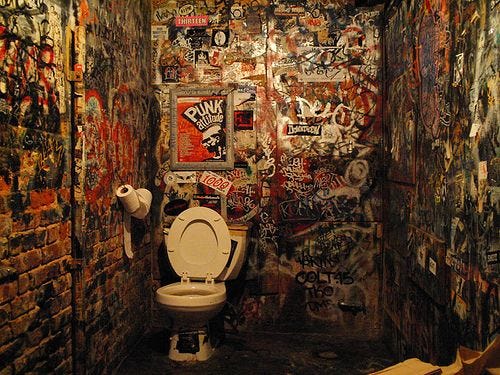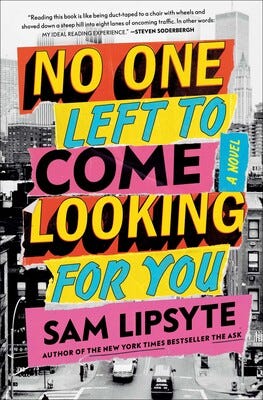No One Left to Come Looking For You, by Sam Lipsyte (Simon & Schuster.)
Given that squalor and drama are such inherently readable subjects, it surprising how few books about fictional rock bands ever manage to capture the squalor and the drama of that world in ways that explain what’s attractive about it. I have yet to read “Daisy Jones and the Six” (which sounds abysmal), but certainly most other novels which take rock as their topic have failed, for the more or less obvious reason that writing about imaginary music is even harder than writing about real music. If the one is – famously -- like dancing about architecture, then the other is like singing through your elbow. From Don Delillo ("Great Jones Street") to David Mitchell ("Utopia Avenue"), it's been pretty much a wash over the last four decades. The fact is, both the rap and rock worlds, at the height of their excesses were so incredibly over the top that truth was stranger always than fiction - and therefore more fun to read about in their nonfiction form.
Sam Lipsyte’s novel “Noone Left To Come Looking For You,” however, manages to evade the normative crappiness of books about fake rock bands. A lighthearted romp rather than a moralistic doom-scroll, it depicts a world which is now as foreign as the one shown in “La Boheme”, only instead of opera and tuberculosis the social landscape is post-punk and heroin addiction. It is a world that is no longer relevant or even legible – the protagonist, Sam, bonds with his new girlfriend via their shared knowledge of MC5 stage banter, and so on -- but if, like me, you ever willingly risked hepatitis from using the toilet in CBGBs, then you will be immediately charmed by its recreation herein.
The novel opens in early 1993 and the inaugural of President Clinton is on television in the grungy bar that Jack hangs out in with his band-mates. It’s a good decade after punk rock burgeoned in that location, but still well before the area became gentrified beyond recognition; clearly Jack and his friends are still living off the fumes of that world’s previous incarnation, which they consider to be the most exciting/disgusting place on earth. After all, in 1992, CBGBs still exists, even if the bands that play it are actively seeking record contracts, a pursuit which Jack has great contempt for.
Jack in is the bassist in a very bad band called the Shits, a low-rent version of the Jon Spencer Blues Explosion, which Jack proudly describes as, “a giant body that lunges up at the sky and the Earl is the immense and beautiful head, Hera the arms and the legs as she stokes, churns, kicks up towards the stratosphere, and Cutwolf and Dyl are the guts, and I’m the heartbeat, as always, the underpulse of this complex vibrating machine – animal, and now we soar, we drive, we whirl…”
In other words, Jack is exuberant, preachy, pretentious and idealistic – a self-described “pedantic knob” who will tell you the name of every drummer in the Fastbacks as soon as look at you. Jack and his friends live in the 1990s equivalent of garrets, i.e. tiny spaces carved out of storefronts and rundown buildings. They survive on crappy food and piece meal jobs, they rub shoulders with real street-people and junkies, and even, in the case of Alan (AKA “the Banished Earl”), fall into the world of addiction…but they do so by choice rather than necessity. All of them are upper middle-class kids from various suburbs with college degrees who can quote Foucault and DeBord. They don't need to be living like this, they WANT to.
When the book begins, The Banished Earl has disappeared with Jack's bass in order to sell it for smack, and Jack is on a quest to find it in time to play the band's final gig. (They are opening for a bunch of other bands at Artaud's Garage, a real-life dive in Tribeca.) In the course of his brief quest, he swiftly drops by a number of his usual hangouts and friends’ houses, has sex with a possible new girlfriend, interrupts a murder, visits his suburban home in New Jersey, goes to a pretentious art opening where he meets Donald Trump, chases down the villain, and eventually plays the gig, with mixed results.
In structure, then, the book is a mirror image of "A Catcher in the Rye.” Holden wanders around the Upper East Side soliloquizing about his angst and the phoniness of those surrounding him; Jack does the same thing thirty years later, only now its the Lower East Side, the bit players are all junkies and hobos, and the angst has been replaced by a weird kind of joie de vivre, or something like it. Both Jack and Holden have issues with their parents, and both make brief visits home to acquaint us with their background; but both would like to save the world. That Jack is an iteration of Holden is made especially clear in a scene where he finds the toilet blocked in the bar he frequents. Rather than slink away, he rifles through what other bands would do in the circumstances, deciding that Led Zeppelin, Johnny Rotten, GG Allin, would flee, but the Clash, “those large-hearted, collective minded fellows…would they not clear the clog and mop the slop before heading off to an antiracism rally? That is my belief, anyway. I reach back behind the toilet tank, grab an old, crusted plunger, get to work…”
That passage conjures up so much that was real about those times – both the way we looked to certain rock bands to guide our actions, and the way we frequented hellish dives as if they were morally superior to well-heeled, more hygienic places. And what the heck, maybe they were. Today, few people actively seek a life lived in abject penury, but I – and Lipsyte –can assure you that they used to, and it was good. “No One Left To Come Looking For You” understands that the joy for these musicians is not in their creation of great music, or in the pursuit of stardom, but in living the low, low life of an artist. Rather than dwell on the joy of excess and success – the sex, the drugs, the potloads of money – Lipsyte notes the joy that exist in the struggle. And that is right, for truth be told, for when it comes to rock ‘n’ roll, the struggle itself reaps the exact same amount of sex and drugs, only without the tedious grip of money, which poisons all it touches. “No One Left To Come Looking For You” may be about a world you don’t recognize, but then, so is “Anna Karenina.” It’s still well worth visiting.







I didnt! Your book and this one are similar in that they both have a plot (murder mystery) and deeper theme that is more important than the setting, which redeems them! But I don't think the band in your book was supposed to be bad!
Yeah I am not sure it's your type of book but it is hilariously written.